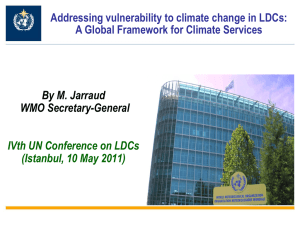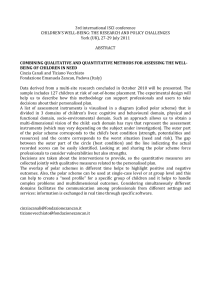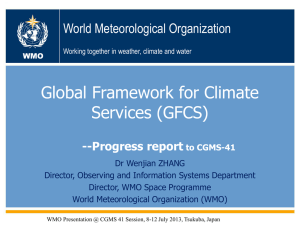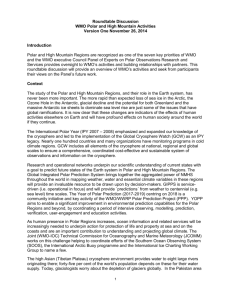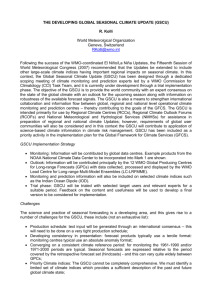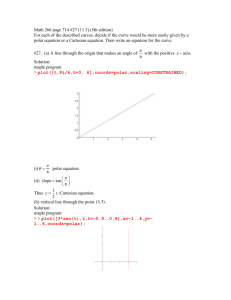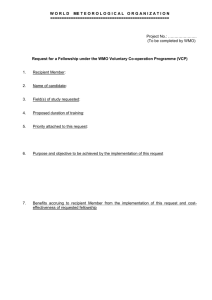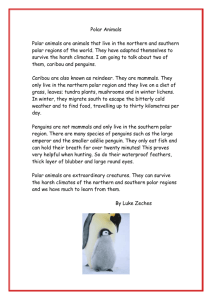Contribution of the Panel to GFCS
advertisement
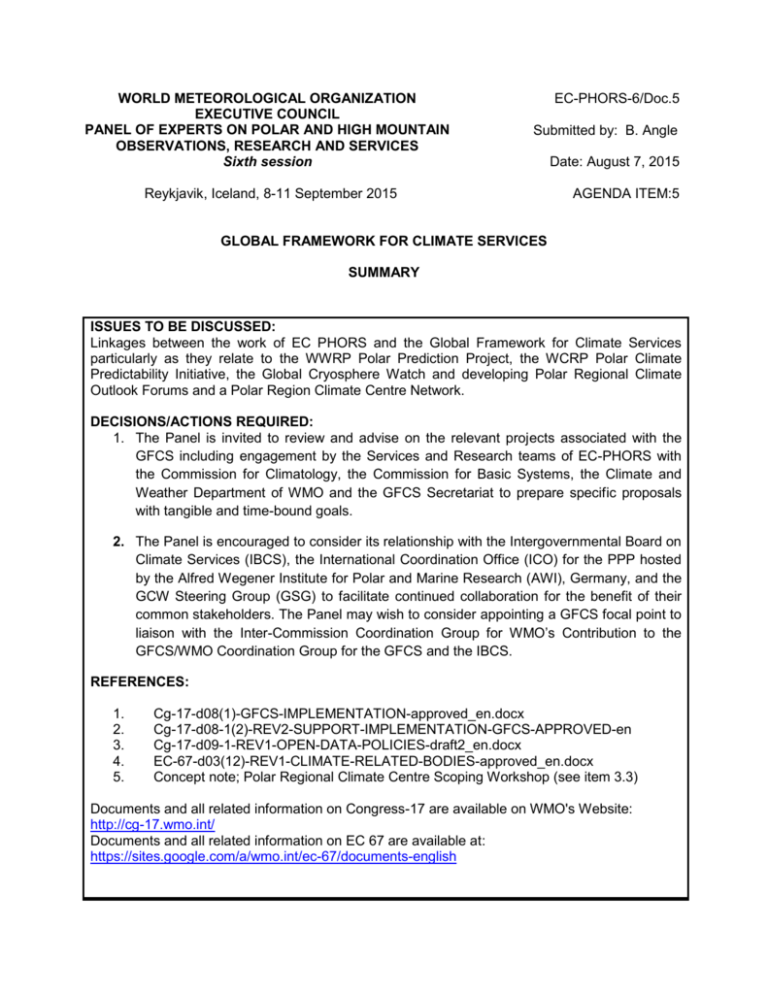
WORLD METEOROLOGICAL ORGANIZATION EXECUTIVE COUNCIL PANEL OF EXPERTS ON POLAR AND HIGH MOUNTAIN OBSERVATIONS, RESEARCH AND SERVICES Sixth session EC-PHORS-6/Doc.5 Submitted by: B. Angle Reykjavik, Iceland, 8-11 September 2015 Date: August 7, 2015 AGENDA ITEM:5 GLOBAL FRAMEWORK FOR CLIMATE SERVICES SUMMARY ISSUES TO BE DISCUSSED: Linkages between the work of EC PHORS and the Global Framework for Climate Services particularly as they relate to the WWRP Polar Prediction Project, the WCRP Polar Climate Predictability Initiative, the Global Cryosphere Watch and developing Polar Regional Climate Outlook Forums and a Polar Region Climate Centre Network. DECISIONS/ACTIONS REQUIRED: 1. The Panel is invited to review and advise on the relevant projects associated with the GFCS including engagement by the Services and Research teams of EC-PHORS with the Commission for Climatology, the Commission for Basic Systems, the Climate and Weather Department of WMO and the GFCS Secretariat to prepare specific proposals with tangible and time-bound goals. 2. The Panel is encouraged to consider its relationship with the Intergovernmental Board on Climate Services (IBCS), the International Coordination Office (ICO) for the PPP hosted by the Alfred Wegener Institute for Polar and Marine Research (AWI), Germany, and the GCW Steering Group (GSG) to facilitate continued collaboration for the benefit of their common stakeholders. The Panel may wish to consider appointing a GFCS focal point to liaison with the Inter-Commission Coordination Group for WMO’s Contribution to the GFCS/WMO Coordination Group for the GFCS and the IBCS. REFERENCES: 1. 2. 3. 4. 5. Cg-17-d08(1)-GFCS-IMPLEMENTATION-approved_en.docx Cg-17-d08-1(2)-REV2-SUPPORT-IMPLEMENTATION-GFCS-APPROVED-en Cg-17-d09-1-REV1-OPEN-DATA-POLICIES-draft2_en.docx EC-67-d03(12)-REV1-CLIMATE-RELATED-BODIES-approved_en.docx Concept note; Polar Regional Climate Centre Scoping Workshop (see item 3.3) Documents and all related information on Congress-17 are available on WMO's Website: http://cg-17.wmo.int/ Documents and all related information on EC 67 are available at: https://sites.google.com/a/wmo.int/ec-67/documents-english EC-PHORS-6/Doc.5 p. 2 Global Framework for Climate Services 1. Intergovernmental Board on Climate Services 1.1 The second session of the Intergovernmental Board on Climate Services (IBCS-2) was held from 10 to 13 November 2014 in Geneva see http://www.gfcs-climate.org/ and the Chair reported on its activities to the Seventeenth Congress. Our community was successful in directing the Board to consider initiatives to improve our understanding of the cryosphere given the accelerating pace of change in all its components. We noted that the Global Cryosphere Watch and the Global Integrated Polar Prediction System should be seen as early successes to enable provision of climate services and products to Polar and High Mountain Regions. 1.2 Congress 17 strongly encouraged direct linkages between the IBCS and the constituent bodies of WMO, in particular, with the Executive Council and with regional associations. Congress supported the inclusion of Energy as a fifth priority area of the GFCS in addition to the existing four; agriculture/food security, water, disaster risk reduction and health. Congress agreed that WMO Constituent bodies and WMO Programmes should identify a GFCS Liaison to report on ways to ensure the alignment of activities with GFCS objectives and, conversely, inform the IBCS of relevant activities that support the GFCS. The Panel considered this and selected (name to be inserted) to be the liaison with the GFCS on Polar and High Mountain activities. The IBCS Management Committee will meet October 24-26, 2015 in Geneva allowing for the outcomes of EC-PHORS-6 to be presented. Third session of the Intergovernmental Board on Climate Services (IBCS-3) is proposed for October 2018. 1.3 Noting the need to assist Members to develop and establish the key GFCS components (e.g. data processing and forecasting systems) and ensure congruence with the implementation of the WMO Strategy for Service Delivery, EC-67 formed a group referred to as the Inter-Commission Coordination Group for WMO’s Contribution to the GFCS, or alternatively WMO Coordination Group for the GFCS (WCG-GFCS) (see; EC-67-d03(12)-Rev1-ClimateRelated-Bodies-approved_en) 2. Establishing Regional Climate Centres (PRCCs) and Regional Climate Outlook Forums (RCOFs) in Polar and High Mountain Regions 2.1 It is recognized that Cryosphere data and products support the development and delivery of weather, climate and water services by Members are foundational to advance the RCC / RCOF concepts in Polar and high mountain regions. The Global Cryosphere Watch (GCW) is designed to provide information for decision-making and policy development for use in real-time for climate change adaptation and mitigation, and for risk management. Thus it will help engage stakeholders and improve our understanding of the connections between changes in polar and high mountain climate and their impacts on the Earth system including temperate and equatorial regions. 2.2 The Programme for Implementing the Global Framework for Climate Services (GFCS) at Regional and National Scales is supported through a grant of approximately CAD $6 million from Environment Canada toward GFCS implementation. It has five regionally based projects two of which relate to EC-PHORS; i) Climate Service for the Arctic Polar Region that provide a total Cdn $1 million toward support to GCW, GIPPS and the establish a Polar Regional Climate Centre(s) and carry out Polar Regional Climate Outlook Forums; EC-PHORS-6/Doc.5 p. 3 ii) Climate Services in South Asia/3rd Pole Region (Himalaya and Tibetan Plateau region) with a total of Cdn $1 million to develop a plan for stakeholder engagement and outreach activities and support efforts to strengthen capacity and develop services in the context of the GFCS. Its goal is to extend the effectiveness, frequency, coverage and dissemination of outputs from the Regional Climate Outlook Forums (RCOFs). 2.2 EC-PHORS is guiding the development of the Polar Regional Climate Centre concept through the Services Task Team (STT) which has been coordinating the consultations on the implementation strategy with the cooperation of the Commission for Climatology (CCl) and the Commission for Basic Systems (CBS). Formal designation as WMO RCCs is through a CCl/CBS mechanism. Although it is our intention to address the Arctic, Antarctic and High Mountain regions, the first efforts will be directed at the Northern hemisphere. 2.3 In February 2015 the WMO informed Members who have a member on the PHORS Panel of the Global Framework for Climate Services (GFCS) project that is funded by the Government of Canada to improve climate service framework across the Arctic Polar Region and the establishment of a Polar Regional Climate Centre (PRCC) or network thereof. The WMO invited Members to complete a survey on the “Needs and Capacity for Polar RCC Services”. Many Panel members were involved in the completion of the survey. The survey results will be distributed prior to EC-PHORS-6; they will form a basis for developing a suitable PRCC implementation strategy that will be developed during the Scoping Workshop entitled “Climate Services for Polar Regions: Establishing Polar Regional Climate Centres –Towards Implementing an Arctic PRCC” to take place November 17 – 19, 2015 in Geneva. By the end of the workshop it is expected to identify the entities/institutions that may participate in or benefit from the PRCC, and to determine how best to support GFCS activities through this initiative. 2.4 Concerning Climate Services in South Asia/3rd Pole Region (Himalaya and Tibetan Plateau region), the International Centre for Integrated Mountain Development (ICIMOD) has been engaged to organize a stakeholders workshop to consider potential strategies for climate services delivery for the Third Pole Region under guidance from EC-PHORS. 3. Data Policy and Emerging Issues 3.1 Congress agreed that the greater the availability and sharing of the data, the greater the applicability and accuracy of the tools and capabilities that support ready, responsive, and resilient communities. It noted that the benefits realized from climate data and products are greatly enhanced when combined with socioeconomic information. Linking physical and social science information enables a wide range of societal benefits and enhances decision support. It noted that those data and products produced and disseminated by the WMO data centres (Global Producing Centres for Long-Range Forecasts, RCCs, RCOFs), the ICSU World data Service and GCOS Essential Climate Variables (ECVs - Atmospheric, Oceanic and Terrestrial) constitute an essential contribution to the GFCS and therefore should be made accessible among Members, in particular through the GFCS CSIS, on a free and unrestricted basis; 3.2 While recognizing the rights of governments to choose the manner by, and the extent to, which they make their GFCS relevant data and products available domestically and for international exchange, taking into consideration relevant international instruments and national policies and legislation, Congress adopted Resolution 60 – WMO Policy on the International Exchange of Climate Data and Products to Support the Implementation of the GFCS. (See Cg17-d08-1 (2) Rev2-Support-Implementation-GFCS-Approved-en). In addition to the climate data and products provided under Annex I to Resolution 40 (Cg-XII), as well as the GFCS relevant EC-PHORS-6/Doc.5 p. 4 hydrological data and products in Resolution 25 (Cg-XIII), the following types of data and products are considered necessary for the implementation of GFCS: (1) Historical climate time-series from the Regional Basic Climate Networks (RBCNs), the GCOS Upper-Air Network and GCOS Surface Network at a temporal and spatial resolution necessary to resolve the statistics of climate, including trends and extremes; (2) Essential climate variables for the ocean (full depth) (as defined by the GCOS Implementation Plan); (3) Climate relevant coastal interface data, in particular sea level, waves and storm surges; (4) Data on the composition of the atmosphere including aerosols; (5) Climate relevant satellite data and products; (6) Climate relevant cryospheric data, in particular snow cover, snow depth, glacial monitoring, permafrost and lake and river ice. 3.3 Congress decided to conduct a global survey and analysis of Members’ various data policies and models of service provision (e.g. cost recovery, public services) and identify successful strategies for sustaining the observing networks and for the maintenance and operation of the data preparation and management systems, necessary to support the implementation of the Resolution. Congress also decided to undertake a review of the challenges, risks, opportunities and benefits related to ‘Big Data’, ‘Crowd-Sourced Data’, ‘Social Media’ as well as emerging and future data sources 4. Conclusions 4.1 The Panel may wish to consider the projects outlined in section 2 of this information note to ensure the outcomes are integrated with the workplans of WMO Constituent Bodies, WMO Programmes, the International Coordination Office for the Polar Prediction Project of GIPPS and the Global Cryosphere Watch Steering Group. The Panel may also consider how broaden its activities to address high mountain regions beyond the South Asia/3rd Pole Region (Himalaya and Tibetan Plateau region). 4.2 The Panel may consider the ideal organizational structure for the Polar Region Climate Centre network and the Polar Region Climate Outlook Forum to inform the Scoping workshop in November and propose experts. 4.3 The Panel may wish to consider a mechanism to liaison with the Inter-Commission Coordination Group for WMO’s Contribution to the GFCS or WMO Coordination Group for the GFCS as it may be referred and with the IBCS. 4.3 The Panel should take note of steps to implement the WMO Policy for International Exchange of Climate Data and Products to Support the Implementation of the GFCS.
